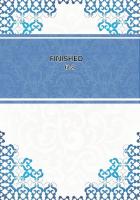He meditated upon Bert for a time. "So far as I can judge, Smallways," he said, "the Prince will probably want to throw you overboard--next time he thinks of you. He certainly will if he sees you.... After all, you know, you came als Ballast.... And we shall have to lighten ship extensively pretty soon. Unless I'm mistaken, the Prince will wake up presently and start doing things with tremendous vigour.... I've taken a fancy to you.
It's the English strain in me. You're a rum little chap. Ishan't like seeing you whizz down the air.... You'd better make yourself useful, Smallways. I think I shall requisition you for my squad. You'll have to work, you know, and be infernally intelligent and all that. And you'll have to hang about upside down a bit. Still, it's the best chance you have. We shan't carry passengers much farther this trip, I fancy. Ballast goes over-board--if we don't want to ground precious soon and be taken prisoners of war. The Prince won't do that anyhow. He'll be game to the last."4By means of a folding chair, which was still in its place behind the door, they got to the window and looked out in turn and contemplated a sparsely wooded country below, with no railways nor roads, and only occasional signs of habitation. Then a bugle sounded, and Kurt interpreted it as a summons to food. They got through the door and clambered with some difficulty up the nearly vertical passage, holding on desperately with toes and finger-tips, to the ventilating perforations in its floor. The mess stewards had found their fireless heating arrangements intact, and there was hot cocoa for the officers and hot soup for the men.
Bert's sense of the queerness of this experience was so keen that it blotted out any fear he might have felt. Indeed, he was far more interested now than afraid. He seemed to have touched down to the bottom of fear and abandonment overnight. He was growing accustomed to the idea that he would probably be killed presently, that this strange voyage in the air was in all probability his death journey. No human being can keep permanently afraid: fear goes at last to the back of one's mind, accepted, and shelved, and done with. He squatted over his soup, sopping it up with his bread, and contemplated his comrades.
They were all rather yellow and dirty, with four-day beards, and they grouped themselves in the tired, unpremeditated manner of men on a wreck. They talked little. The situation perplexed them beyond any suggestion of ideas. Three had been hurt in the pitching up of the ship during the fight, and one had a bandaged bullet wound. It was incredible that this little band of men had committed murder and massacre on a scale beyond precedent. None of them who squatted on the sloping gas-padded partition, soup mug in hand, seemed really guilty of anything of the sort, seemed really capable of hurting a dog wantonly. They were all so manifestly built for homely chalets on the solid earth and carefully tilled fields and blond wives and cheery merry******.
The red-faced, sturdy man with light eyelashes who had brought the first news of the air battle to the men's mess had finished his soup, and with an expression of maternal solicitude was readjusting the bandages of a youngster whose arm had been sprained.
Bert was crumbling the last of his bread into the last of his soup, eking it out as long as possible, when suddenly he became aware that every one was looking at a pair of feet that were dangling across the downturned open doorway. Kurt appeared and squatted across the hinge. In some mysterious way he had shaved his face and smoothed down his light golden hair. He looked extraordinarily cherubic. "Der Prinz," he said.
A second pair of boots followed, ****** wide and magnificent gestures in their attempts to feel the door frame. Kurt guided them to a foothold, and the Prince, shaved and brushed and beeswaxed and clean and big and terrible, slid down into position astride of the door. All the men and Bert also stood up and saluted.
The Prince surveyed them with the gesture of a man who site a steed. The head of the Kapitan appeared beside him.
Then Bert had a terrible moment. The blue blaze of the Prince's eye fell upon him, the great finger pointed, a question was asked. Kurt intervened with explanations.
"So," said the Prince, and Bert was disposed of.
Then the Prince addressed the men in short, heroic sentences, steadying himself on the hinge with one hand and waving the other in a fine variety of gesture. What he said Bert could not tell, but he perceived that their demeanor changed, their backs stiffened. They began to punctuate the Prince's discourse with cries of approval. At the end their leader burst into song and all the men with him. "Ein feste Burg ist unser Gott," they chanted in deep, strong tones, with an immense moral uplifting.
It was glaringly inappropriate in a damaged, half-overturned, and sinking airship, which had been disabled and blown out of action after inflicting the cruellest bombardment in the world's history; but it was immensely stirring nevertheless. Bert was deeply moved. He could not sing any of the words of Luther's great hymn, but he opened his mouth and emitted loud, deep, and partially harmonious notes....
Far below, this deep chanting struck on the ears of a little camp of Christianised half-breeds who were lumbering. They were breakfasting, but they rushed out cheerfully, quite prepared for the Second Advent. They stared at the shattered and twisted Vaterland driving before the gale, amazed beyond words. In so many respects it was like their idea of the Second Advent, and then again in so many respects,it wasn't. They stared at its passage, awe-stricken and perplexed beyond their power of words.
The hymn ceased. Then after a long interval a voice came out of heaven. "Vat id diss blace here galled itself; vat?"They made no answer. Indeed they did not understand, though the question repeated itself.















